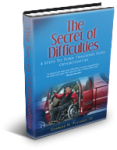Two Quadriplegics and a Paraplegic Share Inspirational Thoughts About Returning to Work Page 2
LeighAnn Martinez: Furthering her education to prepare for a new career
LeighAnn Martinez is a paraplegic who has good control and use of her arms, upper body, and hands. Among those I interviewed, she retains the most function and control. She needed few adaptations in a typical workplace environment.
Martinez, age 34, was injured roughly two and a half years ago when she was play wrestling. An energetic, engaging, and attractive woman, LeighAnn now works as a liaison between the Kessler Institute for Rehabilitation and the Kessler Foundation to help coordinate programs in common with these two separate entities. Among other things her responsibilities include recruiting research subjects, explaining the studies, and scheduling participants to come in and complete the research.
Martinez’s injury level is T–10 Complete, which requires her to use a wheelchair. With her injury she retains use and control of her arms, upper body and hands. These abilities allow her to function at her job on a high level and with very little assistance from her employer or coworkers. It also means that since she works at Kessler Memorial Hospital, which is fully equipped according to the specifications created under the American with Disabilities Act, she needed very little done in order to accommodate her wheelchair and other needs. In fact, she only needed to have a drawer removed from her desk to accommodate her wheelchair inorder to be fully independent in the office.
Martinez had been a massage therapist before her injuries. She realized that the job that she had been trained for would no longer be a practical way to make a living.
Fleisher: Coming off an injury and starting a job do you feel like you need to go above and beyond in order to prove your worth in relationship to your disability?
Martinez: No, absolutely not. The only reason I do that is because I love everyone that I work for, and I especially love my boss. I don’t feel I have to go above and beyond because I’m making up for my disability or feel insecure that people won’t think I’m doing my part.
Fleisher: What advice do you have for the newly injured?
Martinez: Go back to school ASAP. I really had to start from the bottom level and work my way up. Right now I’m getting my Bachelor’s, and then I will get my Master’s in psychology. My recommendation is, if you don’t have a car, or if you’re still not comfortable with your body, whether it be bowel or bladder, things like that, go to school online. Get started. Those two years, that window where you need to find yourself out, I think is totally legit, and it’s great. You need to go to therapy. You need to think about yourself. You need to try to get better. I think everyone should take that two–year window. But don’t waste it. You can go to school online while you’re trying to get to know your body in the comfort of your own home. When you’re on government assistance like disability, the government pays for so much school, and there are so many programs out there when you’re not in the workforce technically.”
Fleisher: What advice do you have for employers?
Martinez: If you have a valuable employee that you want to stick around, get to know their injury. Say you’ve just hired someone. Get to know what a spinal cord injury really entails. I mean just for yourself have awareness of dysreflexia or urinary tract infections (UTIs) and what happens, and how ill you can be. Understand that a spinal cord injury doesn’t just mean a person can’t walk. It means a lot of other things can be affected. Before I was injured I thought, “You’re in a wheelchair you can’t walk.” I didn’t realize that all your organs weren’t functioning on call. Just being aware of the injury itself and knowing that there are limitations you become more understanding and a better employer.
Fleisher: Do you think people are nicer to you because of your disability?
Martinez: No, they’re not nicer, but I feel that they admire me. Like they think that I’m strong. They think, ‘Oh look at her, she went through a life altering experience and she’s here in the workforce, and she’s happy, and she’s doing a great job.’ So I think that they look up to me like I’m inspirational, and I hope they treat me well because I am a nice person, but I don’t think I’m favored because of my disability.




